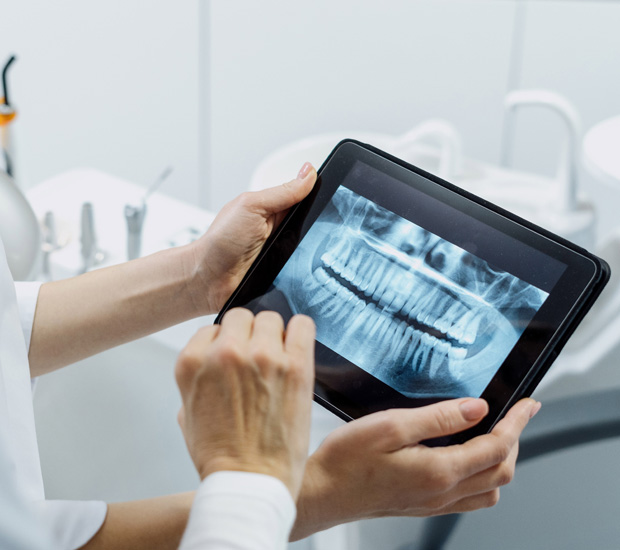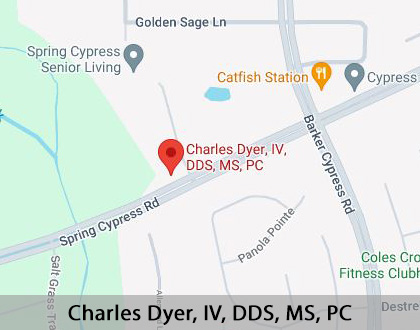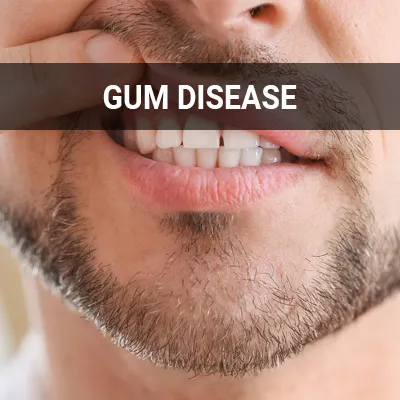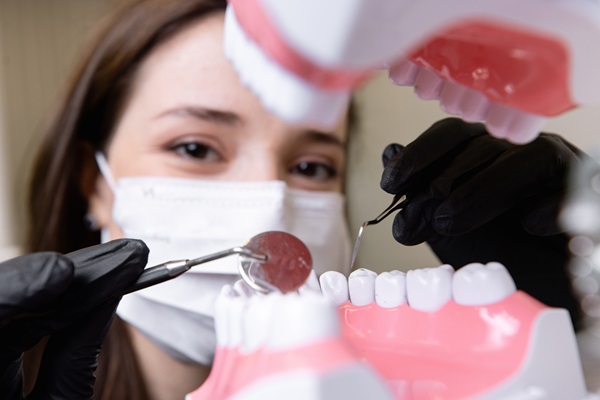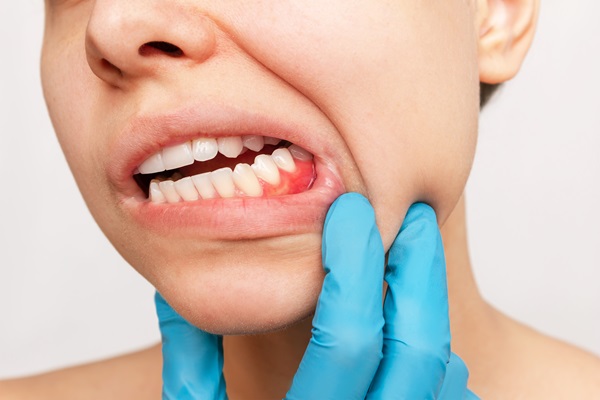Periodontal Disease Cypress, TX
Periodontal disease is a severe form of gum disease that results from poor oral hygiene habits and untreated oral conditions. Periodontists are dental specialists that focus on the gums, helping treat gum conditions before they worsen. Although periodontal disease is irreversible, many treatments can help prevent it from occurring, and other methods can keep the oral cavity healthy enough to avoid more complications in the future.
Periodontal disease treatment is available at Charles E. Dyer IV, DDS, MS, PC in Cypress and the surrounding area. Our team can diagnose, treat, and help prevent any oral or gum conditions from developing or progressing further. Call us today at (281) 213-0900 to schedule an appointment or learn more about our services.
What is Periodontal Disease?
Advanced gum disease, or periodontal disease , refers to severe infection of the soft tissues that hold the teeth in place. In its early stages, known as gingivitis, the gums appear red, swollen, and tender. Gingivitis is treatable and reversible, especially when detected early. However, the disease will worsen over time without adequate oral care and necessary treatment, eventually developing into more serious forms of gum disease.
According to the Centers for Disease Control and Prevention, CDC, close to half of adults in the U.S. aged 30 years and older have some form of periodontal disease. In its severe form, periodontal disease causes the gums to pull away from the teeth and often leads to tooth loss. When left untreated, it can also cause bone loss beneath the gums.
“In its severe form, periodontal disease causes the gums to pull away from the teeth and often leads to tooth loss”
Common Causes of Periodontal Disease
The greatest threat to oral health is plaque and tartar buildup. Plaque is a sticky, colorless film of bacteria that forms on the surfaces of teeth due to the accumulation of saliva, food, and fluids. Plaque is easily removed through proper brushing, flossing, and rinsing. However, when plaque consistently remains on the teeth, it turns into tartar, a hardened calculus material that is not easily removed without professional dental tools. Dentists remove tartar during routine dental cleanings, which is why it is crucial that patients regularly visit the dentist.
Patients must brush and floss properly to ensure plaque is completely removed during each cleaning. That means gently brushing in a circular motion over the front, back, and biting surfaces of the teeth. Flossing is crucial in removing excess food debris and plaque buildup between the teeth as bacteria and cavities often form there. Professional dental cleanings are essential in removing hard-to-see buildup and cleaning out the rest of the mouth with tools that the average patient does not have at home.
“The greatest threat to oral health is plaque and tartar buildup.”
Symptoms of Periodontal Disease
Many patients do not know the early signs of poor gum health. Healthy gums are pink, firm, and do not easily bleed when brushing and flossing. The first signs of gum disease are tenderness, swelling, and redness. Patients should seek immediate treatment for these symptoms before the disease progresses.
Symptoms and signs of periodontal disease include:
- A change in the way teeth fit together when biting
- Bad breath
- Bright red or purplish gums
- Swollen, puffy gums that bleed easily or are tender to touch
- Gums that pull away from the teeth
- Loose teeth or loss of teeth
- New spaces developing between the teeth
- Painful chewing
- Pink-tinged toothbrush after brushing
- Pus between the teeth and gums
- Spitting out blood when brushing or flossing the teeth
“Healthy gums are pink, firm, and do not easily bleed when brushing and flossing”
Check out what others are saying about our dental services on Yelp: Periodontal Disease in Cypress, TX
Risk Factors for Periodontal Disease
Periodontal disease is most commonly caused by inadequate oral hygiene habits and a lack of dental care. Periodontal disease may be made worse by lifestyle habits, such as smoking and excessive alcohol consumption. We typically review a patient's medical and dental history and assess their risk factors during their initial consultation appointment and provide preventive treatments to prevent the development of periodontal disease.
Risk factors include diabetes, hormonal changes in girls and women, diabetes, medications that lessen the flow of saliva, certain illnesses, such as AIDS and their medications, and genetic susceptibility. Patients with one or more of these risk factors typically receive stringent treatment and visit the dentist more often. We may prescribe certain gum medications to ensure they remain healthy and do not interact with the patient's other medications.
“Risk factors include diabetes, hormonal changes in girls and women, diabetes, medications that lessen the flow of saliva, certain illnesses, such as AIDS and their medications, and genetic susceptibility.”
Questions Answered on This Page
Q. What is periodontal disease?
Q. What are the common causes of periodontal disease?
Q. What are the symptoms of periodontal disease?
Q. What are the risk factors for periodontal disease?
Q. What are treatments for periodontal disease?
People Also Ask
Q. What types of treatments does a gum dentist offer?
Q. What are some diseases of the body linked to gum health?
Q. How common is periodontitis?
Q. What types of gum medications are there? What medications get prescribed for certain gum conditions?
Periodontal Disease Treatment
Although periodontal disease is irreversible, it can be treated successfully. Treatment often prevents the disease from worsening and helps patients avoid tooth and bone loss. Non-surgical treatment for periodontal disease includes a scaling and root planing procedure, or deep cleaning, which helps gum tissue heal and periodontal pockets shrink. Medications are usually administered into the gums after the scaling and root planing procedure to control infection, inflammation, and pain.
Other treatments for periodontal disease include various invasive and non-invasive procedures. Surgery may be required when a patient's gum pockets have enlarged to the point where a scaling and root planing procedure will not be effective. Bone surgeries and bone grafts, splints, and various devices and appliances help keep loose teeth in place as the gums and underlying bone heal.
For successful healing during the recovery period, patients should rest as much as possible and take all prescribed medications. Follow-up visits are necessary to ensure recovery is going as intended. Patients who have any questions or concerns should call us immediately.
“Non-surgical treatment for periodontal disease includes a scaling and root planing procedure, or deep cleaning, which helps gum tissue heal and periodontal pockets shrink.”
Frequently Asked Questions
Q. What will happen if I do not get treated for periodontal disease?
A. Periodontal disease is a severe gum disease. Going without treatment often results in tooth and bone loss as well as other oral and systemic health conditions, including heart disease, stroke, diabetes, Alzheimer's, some cancers, and pregnancy complications. Gum disease is best treated when diagnosed in its early stages.
Q. How can I prevent periodontal disease if I have weak gums?
A. To help prevent the development of periodontal disease, it is important that patients regularly visit their dentist for routine checkups and dental cleanings. Early signs of gingivitis are generally treated as soon as symptoms occur to prevent the disease from developing further. It is also crucial to floss. We recommend rinsing the mouth with antiseptic or gum mouthwash often.
Q. What are the most common treatments for periodontal disease?
A. Nonsurgical treatments for periodontal disease include a scaling and root planing procedure and antibiotic medications or prescription mouthwash. Surgical treatments include flap surgery (or pocket reduction surgery), soft tissue grafts, bone grafts, guided tissue regeneration, and tissue-stimulating proteins.
Q. What symptoms first appear in a person with periodontal disease?
A. In the early stages of gum disease or gingivitis, a person may notice symptoms such as swollen or bleeding gums, bad breath or a metallic taste in the mouth, receding gums, and increasing space between teeth. As the disease advances, they may experience gum inflammation and the gums pulling away from their teeth. In its severe form, periodontal disease can result in tooth and bone loss and abscesses, or pockets of pus that contain an infection.
Q. Who is qualified to treat periodontal disease?
A. Many people assume or hope that they can have all of their dental needs treated by their primary or general dentist. However, a periodontist is the only dental specialist who can properly diagnose and treat periodontal disease. They focus on conditions of the gums and have additional education and training in the field. In most cases, a general dentist will refer their patient to a periodontist if they have early signs of any form of gum disease.
Start Feeling Better – Visit Us Today
By visiting us as soon as possible, our team can help get you the professional treatment you need. Instead of waiting around and allowing the symptoms to get worse, we can provide you with treatment options.
Definitions
Call Us Today
If you are concerned about symptoms related to periodontal disease or simply want to prevent it, we can help. Call us today at 281-213-0900 to schedule an appointment or learn more about our services. We look forward to answering your questions.
Helpful Related Links
- American Academy of Periodontology (AAP). American Academy of Periodontology (AAP). 2023
- Center for Disease Control and Prevention (CDC), Periodontal Disease Page. Center for Disease Control and Prevention (CDC), Periodontal Disease Page. 2023
- WebMD, What Is a Periodontist?. WebMD, What Is a Periodontist?. 2023
About our business, license, and website security
- Charles E. Dyer IV, DDS, MS, PC was established in 2007.
- We accept the following payment methods: American Express, Cash, Check, Discover, MasterCard, and Visa
- We serve patients from the following counties: Harris County, Washington County, and Waller County
- We serve patients from the following cities: Cypress, Houston, Katy, Spring, The Woodlands, Brenham, Waller, Sugar Land, Jersey Village, and Hempstead
- TX (License #21174). View License Information and Specifics
- National Provider Identifier Database (1285771352). View NPI Registry Information
- Healthgrades. View Background Information and Reviews
- Norton Safe Web. View Details
- Trend Micro Site Safety Center. View Details
Back to top of Periodontal Disease
